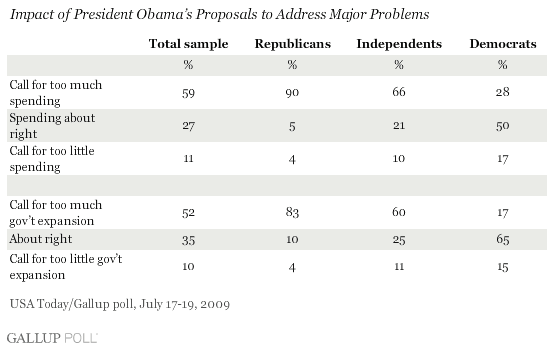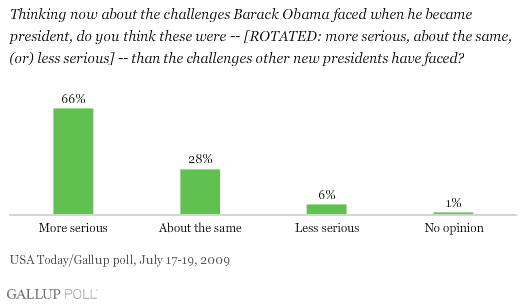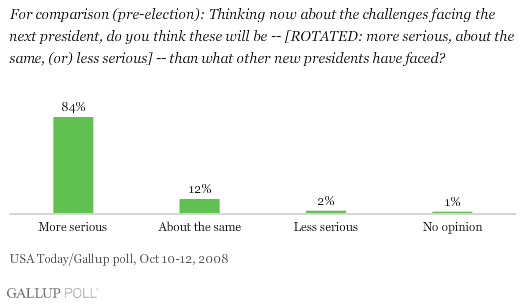PRINCETON, NJ -- Fueled by the sentiments of Republicans and independents, a new USA Today/Gallup poll shows that 59% of Americans say President Obama's proposals to address the major problems facing the country call for too much government spending, and 52% say Obama's proposals call for too much expansion of government power.

It is not surprising to find that Republicans are close to unanimity in their views on these issues, with 90% saying Obama's proposals involve too much spending and 83% saying they involve too much expansion of government power. Of more concern to the Obama administration, perhaps, is the finding that clear majorities of 66% and 60% of independents, respectively, say Obama's proposals involve too much spending and too much government expansion.
Democrats are much more supportive of the administration, as would be expected. Still, a not-insignificant 28% believe that Obama's proposals call for too much spending, offset to a degree by the 17% who say Obama's proposals don't involve enough spending. By contrast, two-thirds of Democrats are satisfied that the expansion of government power that would result from Obama's proposals is about right.
One key point of discussion is whether the increases in government spending and the expansion of government power -- even if distasteful to some -- are necessary to meet today's recessionary economic environment. Germane to that discussion is the result of a separate question in the poll, which shows that two-thirds of Americans believe the challenges Obama faced when he became president are "more serious than the challenges other new presidents have faced."

More than 8 out of 10 Democrats agree that Obama's challenges are more severe, along with two-thirds of independents. Republicans, as expected, are less likely to agree, but 44% say Obama's challenges are more serious, just about on par with the 45% of Republicans who say they are about the same as those of other recent presidents.
Gallup asked this same question in a more generic sense last October, in the midst of the presidential campaign between Obama and John McCain, and found a higher 84% of Americans saying the challenges facing the next president would be more serious than what other new presidents have faced.

The comparison of the two results suggests that views of the severity of the problems facing Obama have softened, although this may be a reflection of the generic nature of the question last fall -- asked about "the next president" -- as opposed to the specific reference to Obama in the current version.
Implications
A good deal of Gallup data reinforce the idea that Americans are concerned about the long-term implications of increased levels of government spending and the expansion of government's role in society that have become a part of the Obama administration's efforts to deal with the recession. Obama receives his lowest approval ratings (out of seven issues tested in the July 17-19 poll) on handling the federal budget deficit (41% approve; 55% disapprove). Thus, the finding that a majority of Americans are worried that Obama's proposals involve too much spending and too much big government are consistent with what would be expected -- as are the very sharp partisan differences in these views.
The key for the Obama administration will be what happens as a result of the government spending and activity in the months ahead. If the economy picks up significantly within the next year and the unemployment rate drops, it will be easier for the administration to argue that its extreme measures have been worth it. If, however, the economy stays in the doldrums, then these data reinforce the conclusion that Obama's actions will provide potent fodder for critics to assail in forthcoming election campaigns.
Survey Methods
Results are based on telephone interviews with 1,006 national adults, aged 18 and older, conducted July 17-19, 2009. For results based on the total sample of national adults, one can say with 95% confidence that the maximum margin of sampling error is ±4 percentage points.
Interviews are conducted with respondents on land-line telephones (for respondents with a land-line telephone) and cellular phones (for respondents who are cell-phone only).
In addition to sampling error, question wording and practical difficulties in conducting surveys can introduce error or bias into the findings of public opinion polls.
